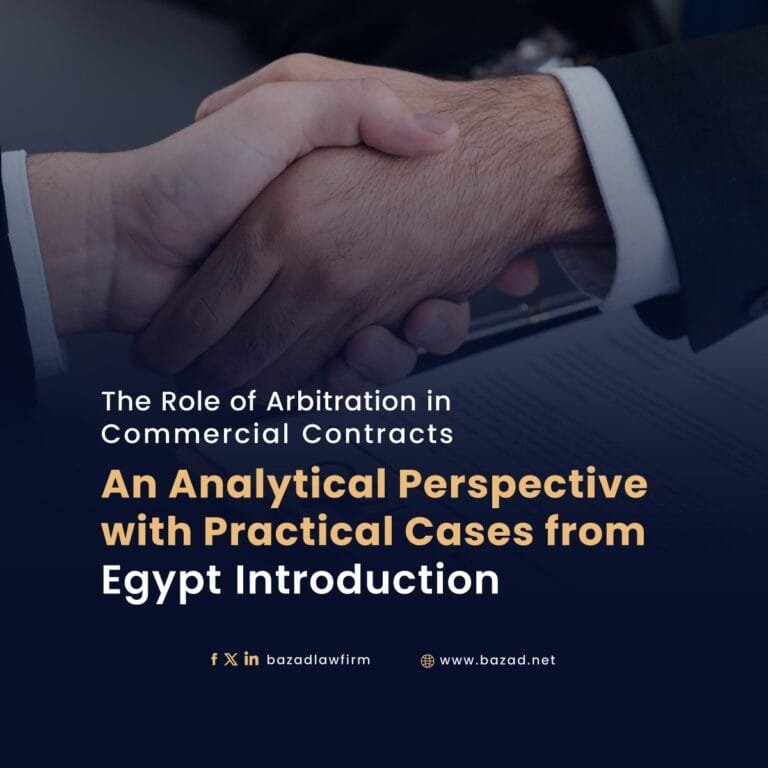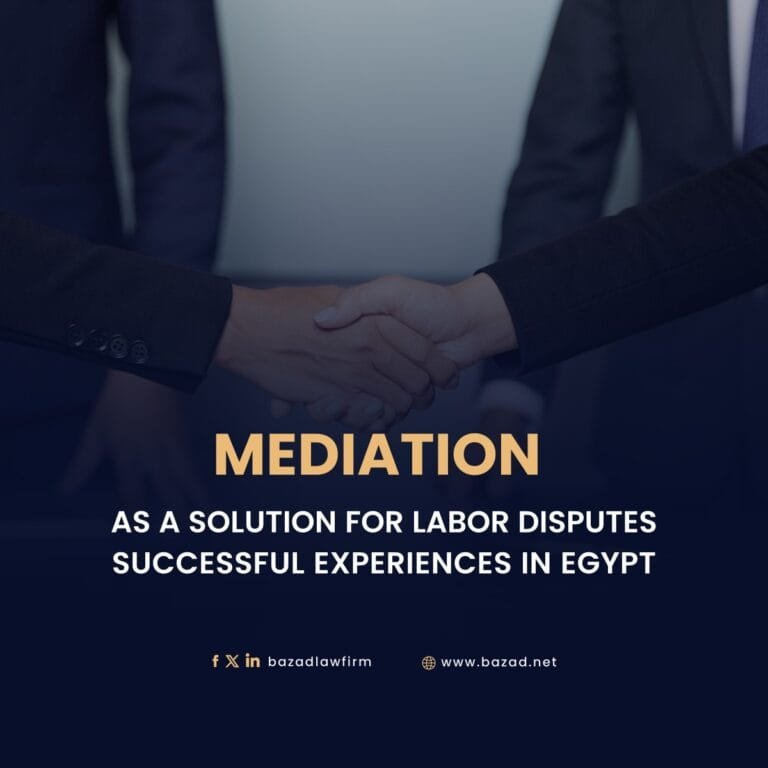
Legal and Procedural Obstacles Hindering the Spread of Arbitration and Mediation
Legal and Procedural Obstacles Hindering the Spread of Arbitration and Mediation
Alternative dispute resolution methods, such as arbitration and mediation, are effective tools that can enhance the investment climate and the economic environment. Despite their significant benefits, several legal and procedural obstacles hinder their spread, particularly in legal contexts such as Egypt. This article examines these obstacles, the reasons for lack of awareness and trust, and how to overcome these challenges to enhance the role of alternative dispute resolution methods.
-
Legal Obstacles
1.1. Incomplete Legal Framework
Many countries, including Egypt, lack a comprehensive legal framework governing arbitration and mediation. Although the Egyptian Arbitration Law No. 27 of 1994 was amended by Law No. 9 of 2019, its application requires further development to align with international standards. (Source: Egyptian Ministry of Justice)
1.2. Legal Inconsistencies
Some local laws may conflict with arbitration systems, leading to instances of legal uncertainty. For instance, certain laws may contradict the powers of arbitrators or govern specific methods of enforcing awards, deterring parties from resorting to these methods. (Source: Study on Commercial Arbitration in Egypt, Legal Studies Center, 2022)
1.3. Lack of Clarity in International Arbitration Rules
International arbitration requires a clear understanding of the applicable laws in various countries. The absence of clear legal mechanisms for resolving international disputes creates anxiety for foreign investors, prompting them to avoid engaging with the Egyptian market. (Source: United Nations Commission on International Trade Law Report, 2020)
-
Procedural Obstacles
2.1. Complexity of Procedures
The legal procedures related to arbitration and mediation can be complex and lengthy. Such complexities may deter parties from utilizing these solutions, especially if they are unfamiliar with these systems. (Source: Study on the Effectiveness of Alternative Dispute Resolution Methods, 2021)
2.2. Associated Costs
The costs of arbitration and mediation can be significant, limiting their accessibility. The fees associated with arbitration institutions may be high, making these options unavailable to parties with limited financial resources. (Source: Study on Cost and Effectiveness in Commercial Arbitration, 2022)
2.3. Shortage of Qualified Arbitrators
There is a shortage of qualified and specialized arbitrators in certain fields, which may adversely affect the effectiveness of arbitration. Training and qualifying arbitrators is essential to ensure the quality of services provided. (Source: General Arbitration Authority Report, 2023)
Lack of Awareness and Trust
Cultural factors and a lack of awareness about alternative methods are significant obstacles. Many individuals and companies believe that the traditional judiciary is the most reliable option, limiting their use of arbitration and mediation.
1.1. Traditional Legal Culture
The legal community in Egypt tends to adhere to the traditional judicial system, which deters many parties from using alternative methods. There is a perception that traditional solutions are more reliable despite the lengthy processes in courts. (Source: Sociological Study on the Legal System in Egypt, 2021)
1.2. Past Negative Experiences
Some parties that have tried alternative methods may have had negative experiences, leading to increased distrust. Therefore, it is crucial to improve the overall experience to encourage the use of these methods. (Source: Report on Arbitration Experiences in Egypt, 2022)
Overcoming These Challenges
- Increasing Awareness and Education: Awareness campaigns should be implemented to clarify the advantages of arbitration and mediation. Workshops and training seminars targeting lawyers, businesspeople, and students can be organized. Collaboration with academic institutions can help improve awareness of these methods.
- Improving the Legal Framework: The government should amend existing laws to align them with international standards and facilitate arbitration and mediation processes. Engaging international experts can assist in enhancing the legal framework.
- Streamlining Procedures: Efforts should be made to simplify procedures to make them more straightforward and accessible. The development of electronic platforms could facilitate access to arbitration and mediation services.
- Providing Financial Support: Establishing funds to support parties with limited income in covering the costs of arbitration and mediation could be beneficial. This includes offering free or discounted legal consultations.
- Training Arbitrators: Providing training programs for arbitrators to ensure their qualification and enhance their skills is essential for raising the quality of service.
The Role of Alternative Dispute Resolution in Attracting Foreign Investment to Egypt
Alternative dispute resolution methods play a crucial role in attracting foreign investment.
- Building Trust: When investors feel that they have effective and swift mechanisms for resolving disputes, it enhances their confidence in the Egyptian market. Arbitration and mediation can be important tools for negotiation and amicable resolution of issues.
- Saving Time and Money: Alternative methods resolve disputes more quickly and at lower costs, making the investment environment more attractive. The time saved in resolving disputes contributes to reducing overall business costs.
- Compliance with International Standards: A strong system of arbitration and mediation in Egypt reflects the country’s commitment to international standards, attracting more investments. Having an effective system is a positive indicator for international investors.
- Enhancing Business Relations: Alternative methods can help strengthen business relationships among parties, as they allow investors to resolve disputes amicably without resorting to publicly disclosed legal battles.
Conclusion
Alternative dispute resolution methods, such as arbitration and mediation, are vital tools for enhancing investments in Egypt. By overcoming legal and procedural obstacles and increasing awareness, these mechanisms can play a fundamental role in improving the business environment and attracting more foreign investors. Building trust in these methods will have a positive impact on the Egyptian economy overall, contributing to sustainable development.
References
- Egyptian Ministry of Justice, “Arbitration Law No. 27 of 1994.”
- Legal Studies Center, “Study on Commercial Arbitration in Egypt,” 2022.
- United Nations Commission on International Trade Law, “Report on International Arbitration,” 2020.
- “Study on the Effectiveness of Alternative Dispute Resolution Methods,” 2021.
- General Arbitration Authority, “Report on Arbitration Experiences in Egypt,” 2023.
- “Sociological Study on the Legal System in Egypt,” 2021.






